Thailand - Stop TB Partnership
Thailand - Stop TB Partnership
Thailand - Stop TB Partnership
You also want an ePaper? Increase the reach of your titles
YUMPU automatically turns print PDFs into web optimized ePapers that Google loves.
Civil society engagement in <strong>TB</strong> policymaking<br />
Public pressure is still not felt by the National <strong>TB</strong> Programme; it’s still a<br />
specialist program, and we’re still telling the public what to do—that we<br />
know best. We need to show that the right belongs to the people [and the]<br />
provision of <strong>TB</strong> services has . . . to be seen as an obligation. Until we do<br />
this, [<strong>TB</strong> control] is not sustainable, and we won’t reach the targets.<br />
—Afsan Chowdhury, Public Health Watch researcher and director of<br />
advocacy, BRAC, Bangladesh 66<br />
Civil society engagement in the design, implementation, and evaluation of <strong>TB</strong> policies<br />
at the national and international levels has been minimal. Though the importance of<br />
community involvement in addressing many of the issues raised in Public Health Watch<br />
reports is increasingly acknowledged at the rhetorical level, there are still far too few mechanisms<br />
and opportunities for meaningful participation. NGOs working in the field of health<br />
are still seen primarily as service providers; their role in promoting and demanding greater<br />
governmental accountability for delivering effective <strong>TB</strong> policies and services is not widely<br />
recognized.<br />
At the national level, <strong>TB</strong> officials are not accustomed to receiving scrutiny from<br />
civil society actors. In Nigeria and Tanzania, Public Health Watch researchers found that <strong>TB</strong><br />
officials were resistant to the idea that “nonexperts” could have a role to play in assessing<br />
quality of services or in helping to design and implement community-based and patientcentered<br />
programs. “The attitudes of some government health workers—maybe they have<br />
to change,” a health activist in <strong>Thailand</strong> said. “It seems like [<strong>TB</strong> experts] think they know<br />
everything. They are very knowledgeable, but they don’t trust that NGOs can work on these<br />
issues . . . because we have not been formally trained.” 67 In other countries, there are initial<br />
signs of increasing support for civil society engagement in <strong>TB</strong> policymaking. For example,<br />
BRAC’s impact on the development and implementation of <strong>TB</strong> policy in Bangladesh and<br />
beyond is widely acknowledged. And since 2003 the Brazilian NTP has indicated greater<br />
receptivity to community sector involvement in monitoring implementation of its policies;<br />
in 2004, the Ministry of Health announced its support for a new “Brazilian <strong>Partnership</strong><br />
Against <strong>TB</strong>,” a visible sign of renewed support for a multisectoral <strong>TB</strong> control effort.<br />
At the same time, civil society engagement at the international <strong>TB</strong> policymaking<br />
level has been minimal, though there are signs that this situation too may be changing with<br />
the increasing involvement of experienced HIV/AIDS activists and former <strong>TB</strong> patients in the<br />
<strong>Stop</strong> <strong>TB</strong> <strong>Partnership</strong> and other international bodies. To date, WHO officials have insisted<br />
that the primarily statistical and epidemiological nature of its annual Global Tuberculosis<br />
Control report must be preserved. As such, NGOs have not generally been invited to<br />
PUBLIC HEALTH WATCH MONITORING REPORTS 27



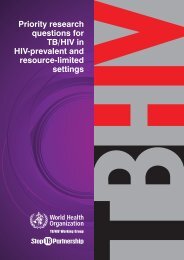

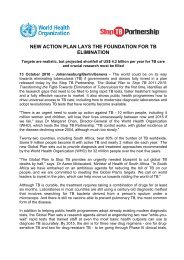
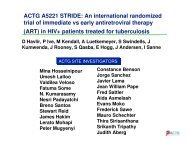
![Global Drug Facility Annual Report 2011 [.pdf] - Stop TB Partnership](https://img.yumpu.com/26788745/1/184x260/global-drug-facility-annual-report-2011-pdf-stop-tb-partnership.jpg?quality=85)

![Concept note on national stop TB partnership [.pdf]](https://img.yumpu.com/26788741/1/184x260/concept-note-on-national-stop-tb-partnership-pdf.jpg?quality=85)

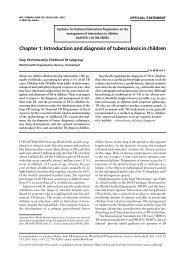
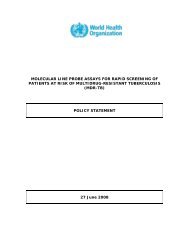
![2005 and Challenges for 2006 - 2015 [.pdf] - Stop TB Partnership](https://img.yumpu.com/26788674/1/190x245/2005-and-challenges-for-2006-2015-pdf-stop-tb-partnership.jpg?quality=85)
![Brochure (French) [.pdf] - Stop TB Partnership](https://img.yumpu.com/17234792/1/190x91/brochure-french-pdf-stop-tb-partnership.jpg?quality=85)

